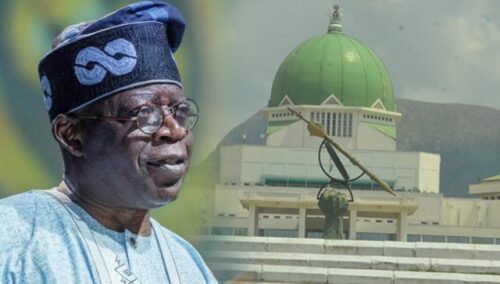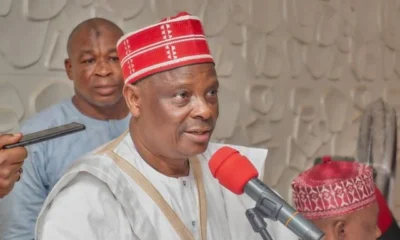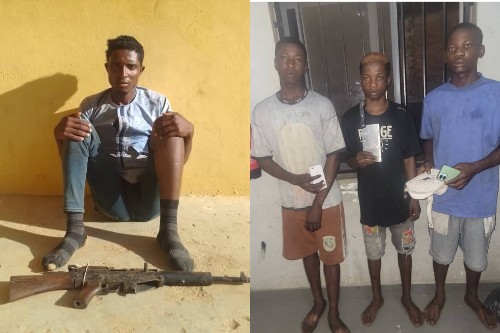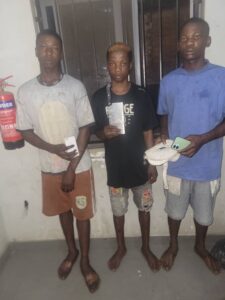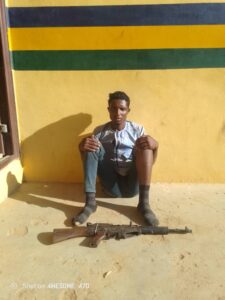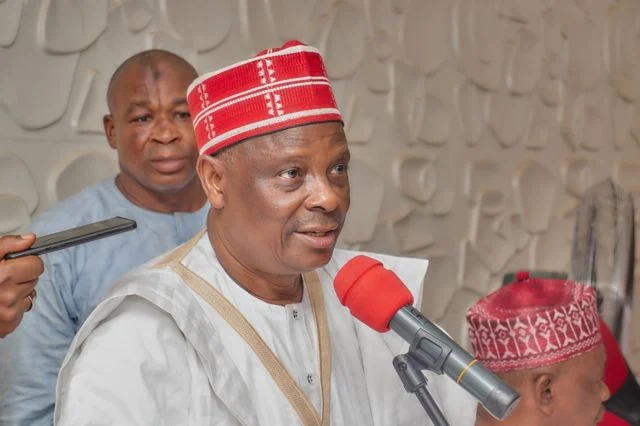The President-elect, Bola Tinubu, has said he has no preferred candidates for the leadership of both the Senate and the House of Representatives in the 10th National Assembly.
Tinubu, represented by the Vice President-elect, Kashim Shettima, disclosed this at the meeting with new members-elect to the National Assembly in Abuja.
A member-elect for Bungudu/Maru Federal Constituency of Zamfara State, Abdulmalik Bungudu, revealed this to our correspondent shortly after the meeting.
Bungudu, who spoke in the Hausa language, revealed that Tinubu told attendees that he had no preferred candidates for any of the principal offices of the 10th NASS.
He quoted Shettima as saying, “For now, he (Tinubu) said he doesn’t have anybody that he prefers to have as Senate President or Speaker, but consultations are going to continue to get the way out for the party and to also ensure the party emerges victorious in the forthcoming governorship and Houses of Assembly elections.”
Meanwhile, lawmakers newly elected on the platform of the All Progressives Congress, on Monday, in Abuja, said the party would zone principal offices only after the conclusion of the governorship and state Assembly elections holding on Saturday, March 18.
The Speaker of the House of Representatives, Femi Gbajabiamila, among other lawmakers-elect, disclosed this to our correspondent after a meeting between senators-elect and House of Representatives members-elect with the party leadership held at the Banquet Hall of the State House, Abuja.
The meeting, which comes barely two weeks after the February 25 presidential and National Assembly elections, is the first between the newly-elected members of parliament and the party.
It followed rife speculations that the APC would use the medium to speedily zone principal offices in the two chambers of the 10th National Assembly to avert a repeat of the 2015 scenario where the party lost grip of the legislature despite retaining the most number of seats in both chambers.
However, the Speaker of the House, Gbajabiamila, told our correspondent that the conversation did not entail any discussion about the NASS leadership because the elections were not over.
Gbajabiamila said, “On the issue of zoning, we did not talk about it because we’re not there yet. We have an election coming up this weekend. And we need to ensure everybody goes back home, roll up their sleeves and get their hands dirty.
“I was in Lagos and I could not leave Lagos because I was campaigning for my party.
“We’re not there yet; we need to complete the victory before we start talking about the leadership of the National Assembly. The reason we didn’t discuss zoning is because we all agreed to tarry for a while until we finish the elections.”
Similarly, the senator representing Niger East Senatorial District, Mohammed Musa, said, “This is not the right time to discuss zoning. All we need now is to consolidate our victory. We have won the presidential election and we should be able to take at least 30 states.”
On his part, Senator Mohammed Ndume, who will represent Borno South in the 10th NASS, said the party leadership urged the lawmakers-elect to shelf their ambitions in the meantime and deliver their states to the APC come March 18.
“The party appealed to NASS members-elect to play down the leadership issues and focus more on ensuring that we take the election battle to the end. And that is to ensure that we win our states,” Ndume said.
Earlier at the meeting, the National Chairman of the APC, Senator Abdullahi Adamu, warned the senators-elect and Reps-elect that the National Working Committee of the APC would not allow a repeat of the NASS leadership tussle that created ‘bad blood’ among lawmakers and the executives in 2015.
Adamu’s address is coming a few days after disgruntled members of the NWC called for the reformation of the party and his resignation to balance the contentious Muslim-Muslim ticket of the incoming administration, which has generated tension before the 2023 elections.
In his speech, Adamu admitted that the ‘civilian coup’ executed by the duo of Senator Bukola Saraki and Yakubu Dogara to emerge as Senate President and House of Representatives Speaker in 2015 was still haunting the ruling party.
He said, “The news media, especially the social media, are full of speculations of some of you jostling for leadership positions in the national assembly.
“This is not unusual. People have the right to struggle for positions of leadership for which they believe they are eminently qualified.
“But we, in the National Working Committee of the party are not comfortable with the tone adopted by those who seek those offices. Those offices are not tribal or sectional rights and must not be so portrayed.”
He drew his audience’s attention to what happened to the party and the National Assembly in 2015 when some members of the federal legislature chose not to wait for the decision of the President and the party before sharing those offices.
“It created bad blood within the party and between the executive and the legislature. I urge us not to regress.
“We would like to offer a word of caution to all of you in this regard. It may be good to start early but sometimes, when you start too early, you jump the gun and court unintended consequences that may cause nasty divisions in the party and thus affect its health.
Leadership position at the national level is a delicate matter and must not be approached with levity or lack.

 BIG STORY4 days ago
BIG STORY4 days ago
 BIG STORY4 days ago
BIG STORY4 days ago
 BIG STORY4 days ago
BIG STORY4 days ago
 BIG STORY4 days ago
BIG STORY4 days ago
 BIG STORY1 day ago
BIG STORY1 day ago
 BIG STORY4 days ago
BIG STORY4 days ago
 BIG STORY5 days ago
BIG STORY5 days ago
 BIG STORY5 days ago
BIG STORY5 days ago




